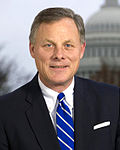2004 United States Senate election in North Carolina
The 2004 United States Senate election in North Carolina was held on November 2, 2004. Incumbent Democratic U.S. Senator John Edwards decided to retire from the Senate after one term in order to run unsuccessfully for the 2004 Democratic Party presidential nomination, and become his party's vice presidential nominee. Republican Richard Burr won the open seat, making it the fifth consecutive election in which partisan control of the seat changed.
| |||||||||||||||||
| |||||||||||||||||
Burr: 40–50% 50–60% 60–70% 70–80% 80–90% >90% Bowles: 40–50% 50–60% 60–70% 70–80% 80–90% >90% Tie: 40–50% | |||||||||||||||||
| |||||||||||||||||
Primaries
editDemocratic
editErskine Bowles won the Democratic Party's nomination unopposed. He had been the party's nominee for the state's other Senate seat in 2002.
Republican
edit| Party | Candidate | Votes | % | |
|---|---|---|---|---|
| Republican | Richard Burr | 302,319 | 87.92% | |
| Republican | John Ross Hendrix | 25,971 | 7.55% | |
| Republican | Albert Wiley | 15,585 | 4.53% | |
| Total votes | 343,875 | 100.00% | ||
General election
editCandidates
edit- Tom Bailey (L), Vietnam War veteran
- Erskine Bowles (D), businessman and President Bill Clinton's chief of staff
- Richard Burr (R), U.S. Representative from North Carolina's 5th congressional district since 1995
Campaign
editBoth major-party candidates engaged in negative campaign tactics, with Bowles' campaign attacking Burr for special interest donations and his positions on trade legislation, and Burr's campaign attacking Bowles for his connections to the Clinton administration. Both attacks had basis in reality: Burr's campaign raised funds from numerous political action committees and at least 72 of the 100 largest Fortune 500 companies, while Bowles departed from the Clinton administration in the midst of the Monica Lewinsky scandal.
Burr won the election by 4%. He joined the Senate in January 2005. Bowles went on to become the president of the UNC system.
Predictions
edit| Source | Ranking | As of |
|---|---|---|
| Sabato's Crystal Ball[2] | Lean R (flip) | November 1, 2004 |
Polling
edit| Poll source | Date(s) administered |
Sample size[a] |
Margin of error |
Richard Burr (R) |
Erskine Bowles (D) |
Other / Undecided |
|---|---|---|---|---|---|---|
| SurveyUSA[3] | October 29–31, 2004 | 616 (LV) | ± 4.0% | 50% | 45% | 5% |
Results
edit| Party | Candidate | Votes | % | ±% | |
|---|---|---|---|---|---|
| Republican | Richard Burr | 1,791,450 | 51.60% | +4.58% | |
| Democratic | Erskine Bowles | 1,632,527 | 47.02% | –4.13% | |
| Libertarian | Tom Bailey | 47,743 | 1.38% | –0.46% | |
| Nonpartisan | Walker F. Rucker (write-in) | 362 | 0.01% | N/A | |
| Total votes | 3,471,720 | 100.00% | N/A | ||
| Republican gain from Democratic | |||||
Counties that flipped from Democratic to Republican
edit- Duplin (Largest city: Wallace)
- Franklin (Largest city: Wake Forest)
- Haywood (Largest city: Waynesville)
- Jones (Largest city: Maysville)
- Madison (Largest city: Mars Hill)
- Montgomery (Largest city: Troy)
- Nash (largest municipality: Rocky Mount)
- New Hanover (largest municipality: Wilmington)
- Brunswick (largest municipality: Leland)
- Greene (largest municipality: Snow Hill)
- Person (largest municipality: Roxboro)
- Pender (largest municipality: Hampstead)
- Swain (largest municipality: Cherokee)
- Washington (largest municipality: Plymouth)
- Perquimans (Largest city: Hertford)
- Camden (Largest city: Camden)
- Dare (Largest city: Kill Devil Hills)
- Forsyth (largest town: Winston-Salem)
- Pitt (largest town: Greenville)
- Lenoir (largest town: Kinston)
- Alleghany (largest town: Sparta)
- Beaufort (largest town: Washington)
- Burke (largest town: Morgantown)
- Cleveland (largest town: Shelby)
- Craven (largest town: New Bern)
- Pamlico (largest town: Bayboro)
See also
editNotes
edit- ^ Key:
A – all adults
RV – registered voters
LV – likely voters
V – unclear
References
edit- ^ a b "North Carolina DataNet #46" (PDF). University of North Carolina. April 2008. Archived from the original (PDF) on July 25, 2008. Retrieved June 12, 2009.
- ^ "The Final Predictions". Sabato's Crystal Ball. Retrieved May 2, 2021.
- ^ SurveyUSA



